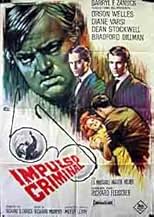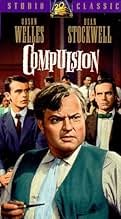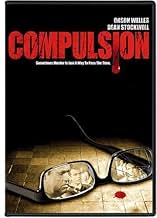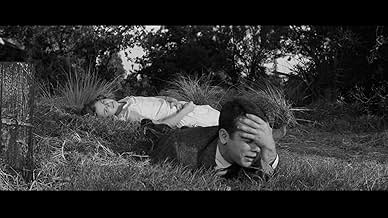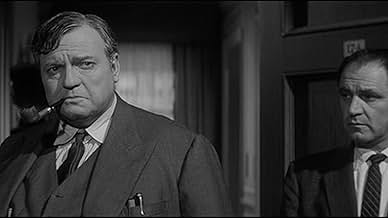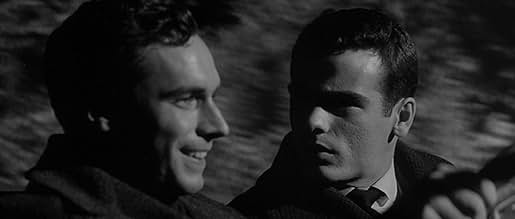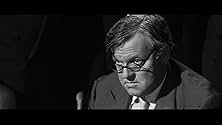IMDb-BEWERTUNG
7,4/10
8185
IHRE BEWERTUNG
In dieser Version des Falls um Leopold und Loeb werden zwei wohlhabende Jurastudenten wegen Mordes vor Gericht gestellt.In dieser Version des Falls um Leopold und Loeb werden zwei wohlhabende Jurastudenten wegen Mordes vor Gericht gestellt.In dieser Version des Falls um Leopold und Loeb werden zwei wohlhabende Jurastudenten wegen Mordes vor Gericht gestellt.
- Regie
- Drehbuch
- Hauptbesetzung
- Nominiert für 1 BAFTA Award
- 1 Gewinn & 5 Nominierungen insgesamt
Robert F. Simon
- Police Lt. Johnson
- (as Robert Simon)
John Alban
- Reporter
- (Nicht genannt)
Don Anderson
- Reporter
- (Nicht genannt)
Brandon Beach
- Courtroom Spectator
- (Nicht genannt)
Terry Becker
- Benson - The Angry Reporter
- (Nicht genannt)
Russ Bender
- Edgar Llewellyn - Attorney
- (Nicht genannt)
Empfohlene Bewertungen
Watching this 1959 Richard Fleischer confirmed something I've always known. Dean Stockwell is a superb actor and an extraordinary presence on the screen. So, I think it's strange that he's not regarded as one of the greatest actors that ever lived. He started as a kid. He was Gregory Peck's son, twice. He was in musicals with Gene Kelly and Frank Sinatra. He was directed by Elia Kazan. He made allegorical movies like "The Boy With Green Hair" directed by black listed Joseph Losey. He was Edmond in "Long Day's Journey Into Night" sharing the screen with Katharine Hepburn, Ralph Richardson and Jason Robards. No to mention his work in "Sons and Lovers" or the movies with Wim Wenders and David Lynch. Here, in "Compulsion" his performance is worthy of an Oscar and in fact he go the accolades at the Cannes Film Festival sharing the acting honors with Orson Welles and Bradford Dillman. But, looking at it now he is the one that comes out as the one who passed in triumph the test of time. His performance is so rich so perfectly modulated that you go straight into the human center of his sick, appalling character. "Compulsion" deserves to be rediscovered and Dean Stockwell's performance should be the main reason.
If "Compulsion" is still such a powerful film is, totally, Dean Stockwell's merit. What a sensational actor! I'm writing this the day after the announcement of Dennis Hopper's death and while I was looking for a Dennis Hopper movie to watch a came across "Compulsion" Not Hopper but Stockwell and I settled for that anyway. I was riveted by Stockwell's performance because everyone else (with the natural exception of Orson Wells and E G Marshall) seems so dated and acted that Dean's every moment is sheer magic. He doesn't shy away from the awfulness but makes his young monster totally human, provoking in us that element that Orson Welles's closing argument tries to bring to the forefront. If you love great acting, you can't afford to miss Dean Stockwell in "Compulsion"
The film deal with two young men (Bradford Dillman , Dean Stockwell) who murder a pal . They are law students and followers to Nietsche theories . They are investigated by an astute prosecutor (E.G.Marshall) . He's growing suspicion but there isn't one perfect crime . As the relentless justice to be executed and they go on trial for killing . A famous lawyer (Orson Welles) will defend them on the accusation of murderers and under death penalty . A young girl (Diane Varsi) will testify for them .
This highly interesting film is inspired on real events about Nathan Leopold-Richard Lob killing case in Chicago of the 1920s . Although the story was obviously a thinly-disguised recreation of the known murder case , the legal department of 20th Century Fox was still concerned about a possible lawsuit from the still-living Leopold . In fact , a great effort was made not to mention Leopold or Loeb in the film , press releases , and interviews . The film contains suspense , drama , tension , illicit love with intertwining triangles , emotion , courtroom trial and complex intrigue maintained throughout . Besides , superb performances by main roles (Dillman , Stockell , Varsi, Welles) and supporting casting (Martin Milner , Robert F. Simon , Gavin McLeod , among others). Special mention for Orson Welles who displays a terrific acting and explaining a significant speech into criminal court . The movie is visually magnificent with an excellent black and white cinematography by William C. Mellor . Evocative and adjusted music by Lionel Newman . The motion picture was wonderfully directed by Richard Fleischer .
This is the second of four film adaptations of the Leopold-Loeb murder case , other versions about same events are the famous ¨The rope¨ (1948) by Hithcock with John Dall (in the character of Bradford Dillman )and Farley Granger (in the role of Dean Stockwell), ¨Swoon¨ and recently ¨Murder by numbers¨ by Barbet Schroeder with Michael Pitt and Ryan Gosling . Indispensable and fundamental seeing for court genre enthusiasts and Orson Welles fans . It's one of Richard Fleisher's best. Rating : Above average .
This highly interesting film is inspired on real events about Nathan Leopold-Richard Lob killing case in Chicago of the 1920s . Although the story was obviously a thinly-disguised recreation of the known murder case , the legal department of 20th Century Fox was still concerned about a possible lawsuit from the still-living Leopold . In fact , a great effort was made not to mention Leopold or Loeb in the film , press releases , and interviews . The film contains suspense , drama , tension , illicit love with intertwining triangles , emotion , courtroom trial and complex intrigue maintained throughout . Besides , superb performances by main roles (Dillman , Stockell , Varsi, Welles) and supporting casting (Martin Milner , Robert F. Simon , Gavin McLeod , among others). Special mention for Orson Welles who displays a terrific acting and explaining a significant speech into criminal court . The movie is visually magnificent with an excellent black and white cinematography by William C. Mellor . Evocative and adjusted music by Lionel Newman . The motion picture was wonderfully directed by Richard Fleischer .
This is the second of four film adaptations of the Leopold-Loeb murder case , other versions about same events are the famous ¨The rope¨ (1948) by Hithcock with John Dall (in the character of Bradford Dillman )and Farley Granger (in the role of Dean Stockwell), ¨Swoon¨ and recently ¨Murder by numbers¨ by Barbet Schroeder with Michael Pitt and Ryan Gosling . Indispensable and fundamental seeing for court genre enthusiasts and Orson Welles fans . It's one of Richard Fleisher's best. Rating : Above average .
"Compulsion" was one of the most important American films of the late 50s. Based loosely on the famous Leopold and Loeb case, the movie still packs quite an impact because of the excellent work by the three principals. As directed by Richard Fleischer, this is a disturbing look at two criminal minds who thought they were above and beyond the law because they had the perfect crime planned. The film was greatly adapted for the screen by Richard Murphy from the Meyer Levin book and stage play.
Even for those clever enough to carry on a murder, there is always a possibility that a minor mistake will give the culprit away. The two young men at the center of the story, Judd Steiner and Artie Straus are homosexual lovers. At the time, being gay in America must have been one of the worst things in a more puritanical and pious society. These two men hide their sexual preference well because of the circles they both move. Coming from upper class families, in a way, made it easier for these men to formulate a plan to satisfy their idle existences.
After committing a heinous crime, just because they thought they could get away with it, the two friends begin experiencing the guilt associated with what they have done. Judd's reaction is different from Artie's. Where Judd tries to lay low, Artie tries to help the police in a bold move that will end up badly. Judd suddenly feels abandoned by Artie when he realizes Artie might be getting too close to the people investigating the murder.
As careful as these men had been, something that apparently seems innocent, ties them to the crime. The principal investigator, Sid Brooks, turns the men against one another by playing his cards right. This is the moment that Jonathan Wilk, the famous trial lawyer enters the picture. Unfortunately, even a star lawyer can't save people that have talked too much because they thought they were above the law.
Star lawyers have always been at the center of all famous trials throughout the history. In a way, it's ironic that only one man, the great Jonathan Wilk is the only person in court to defend Steiner and Straus. Had it been today, these two men would have had a battery of expensive lawyers making the case for them. The figure of Wilke is based on the real lawyer of the Leopold and Loeb case: Clarence Darrow, a man larger than life.
Dean Stockwell and Bradford Dillman made an invaluable contribution to the success of the film. Mr. Stockwell, a child actor that grew up in front of the camera, makes a compelling Judd Steiner. Mr. Stockwell gets under Steiner's skin because he seems to know what made this young man do what he did. Mr. Dillman was a relative new face to the movies, but his performance as Artie Straus has a profound effect on the viewer. Neither man makes a likable person, but maybe that was the message the author of the play wanted to leave the viewer with.
Orson Welles made a splendid appearance as the defense lawyer, Jonathan Wilk. Mr. Welles' physical presence dominates most of the court proceedings. In fact, is a tribute to his genius that he towers over everything around him whenever he is in front of the camera. E. G. Marshall has some good moments as Sid Brooks, the investigator who unearths the truth in this case. Ed Binns, Martin Milner, Robert Simon, Richard Anderson make contributions to the film. Diane Varsi, as the Ruth Evans is the only female that has an opportunity in the film.
The film moves at a quick pace and will, no doubt, satisfy those viewers seeking intelligent entertainment.
Even for those clever enough to carry on a murder, there is always a possibility that a minor mistake will give the culprit away. The two young men at the center of the story, Judd Steiner and Artie Straus are homosexual lovers. At the time, being gay in America must have been one of the worst things in a more puritanical and pious society. These two men hide their sexual preference well because of the circles they both move. Coming from upper class families, in a way, made it easier for these men to formulate a plan to satisfy their idle existences.
After committing a heinous crime, just because they thought they could get away with it, the two friends begin experiencing the guilt associated with what they have done. Judd's reaction is different from Artie's. Where Judd tries to lay low, Artie tries to help the police in a bold move that will end up badly. Judd suddenly feels abandoned by Artie when he realizes Artie might be getting too close to the people investigating the murder.
As careful as these men had been, something that apparently seems innocent, ties them to the crime. The principal investigator, Sid Brooks, turns the men against one another by playing his cards right. This is the moment that Jonathan Wilk, the famous trial lawyer enters the picture. Unfortunately, even a star lawyer can't save people that have talked too much because they thought they were above the law.
Star lawyers have always been at the center of all famous trials throughout the history. In a way, it's ironic that only one man, the great Jonathan Wilk is the only person in court to defend Steiner and Straus. Had it been today, these two men would have had a battery of expensive lawyers making the case for them. The figure of Wilke is based on the real lawyer of the Leopold and Loeb case: Clarence Darrow, a man larger than life.
Dean Stockwell and Bradford Dillman made an invaluable contribution to the success of the film. Mr. Stockwell, a child actor that grew up in front of the camera, makes a compelling Judd Steiner. Mr. Stockwell gets under Steiner's skin because he seems to know what made this young man do what he did. Mr. Dillman was a relative new face to the movies, but his performance as Artie Straus has a profound effect on the viewer. Neither man makes a likable person, but maybe that was the message the author of the play wanted to leave the viewer with.
Orson Welles made a splendid appearance as the defense lawyer, Jonathan Wilk. Mr. Welles' physical presence dominates most of the court proceedings. In fact, is a tribute to his genius that he towers over everything around him whenever he is in front of the camera. E. G. Marshall has some good moments as Sid Brooks, the investigator who unearths the truth in this case. Ed Binns, Martin Milner, Robert Simon, Richard Anderson make contributions to the film. Diane Varsi, as the Ruth Evans is the only female that has an opportunity in the film.
The film moves at a quick pace and will, no doubt, satisfy those viewers seeking intelligent entertainment.
We can add Welles to Wilde, Monroe and others who we never respected until they were gone. His pleading for the lives of those crazy boys (as Clarence Darrow did) is an eloquent plea for the ending of the death penalty. Funny, how a barometer like the death penalty tells us so much about a society's relative civility. The US had backed away from it, but is now swinging back toward even public executions (which I would much prefer, as they show all of us how barbaric we have become).
Note that the movie dwells on their 'craziness' and 'richness', not the Jewishness or the homosexual relationships that evoked the wrath of the public in the real case. Both Dillman and Dean Stockwell do an excellent job of drawing out your anger until you find yourself one of the mob yelling for blood. To stem the tide, in comes Orson Welles. Welles' phrasing and meaningful looks struck me again with what a magnificent actor he was, as well as director.
Now I have to go read 'Compulsion', the novel around which this movie was made, to determine what was left out and if it would have contributed to some of the obviously omitted details that make this movie a little choppy. This movie performs the task that great art must take on itself: to provide us insights into life and how it should be lived. That can be done either negatively or positively, by point or counter-point.
Of course, unless you had some excellent writers and actors of the stature of Welles, you wouldn't come up to the quality of this movie. Definitely, black and white contributed to the brooding quality of the film. Color would have detracted, and you'll seldom 'hear' me say this.
Note that the movie dwells on their 'craziness' and 'richness', not the Jewishness or the homosexual relationships that evoked the wrath of the public in the real case. Both Dillman and Dean Stockwell do an excellent job of drawing out your anger until you find yourself one of the mob yelling for blood. To stem the tide, in comes Orson Welles. Welles' phrasing and meaningful looks struck me again with what a magnificent actor he was, as well as director.
Now I have to go read 'Compulsion', the novel around which this movie was made, to determine what was left out and if it would have contributed to some of the obviously omitted details that make this movie a little choppy. This movie performs the task that great art must take on itself: to provide us insights into life and how it should be lived. That can be done either negatively or positively, by point or counter-point.
Of course, unless you had some excellent writers and actors of the stature of Welles, you wouldn't come up to the quality of this movie. Definitely, black and white contributed to the brooding quality of the film. Color would have detracted, and you'll seldom 'hear' me say this.
Wusstest du schon
- WissenswertesAlthough the story was a thinly-disguised recreation of the Nathan Leopold and Richard Loeb murder case, the legal department of 20th Century Fox was still concerned about a possible lawsuit from the still-living Leopold. A great effort was made not to mention Leopold or Loeb in the movie, press releases, and interviews. However, there was apparently poor communication with the advertising department, since when the movie came out, newspaper ads stated, "based on the famous Leopold and Loeb murder case." Leopold sued the filmmakers. He did not claim libel, slander, nor anything false nor defamatory about the film. Instead, he claimed an invasion of privacy. The court rejected his claim, in part, because Leopold had already published his own autobiography "Life Plus 99 Years," presenting essentially the same facts.
- PatzerWhen the murdered boy is in the morgue, his uncle recognizes him instantly, and the coroner doesn't mention to the young journalist (who found the glasses) that the kid had acid burned all over his face so he couldn't be identified. In the real life case, his face was burned and, most importantly, at the very end of the movie, Orson Welles as the defending attorney mentions that the murdered boy's face was burned with acid.
- Zitate
Jonathan Wilk: If there is any way of destroying hatred and all that goes with it, it's not through evil and hatred and cruelty, but through charity, love, understanding.
- Crazy CreditsOpening credits prologue: CHICAGO, 1924
- VerbindungenFeatured in The Paper Chase: Commitments (1983)
Top-Auswahl
Melde dich zum Bewerten an und greife auf die Watchlist für personalisierte Empfehlungen zu.
- How long is Compulsion?Powered by Alexa
- Is 'Compulsion' based on a book?
- How closely does this movie follow the real story about Leopold and Loeb?
- Who represents Leopold and who represents Loeb in the movie?
Details
- Erscheinungsdatum
- Herkunftsland
- Sprache
- Auch bekannt als
- Compulsión
- Drehorte
- Produktionsfirma
- Weitere beteiligte Unternehmen bei IMDbPro anzeigen
- Laufzeit1 Stunde 43 Minuten
- Farbe
- Seitenverhältnis
- 2.35 : 1
Zu dieser Seite beitragen
Bearbeitung vorschlagen oder fehlenden Inhalt hinzufügen

Oberste Lücke
By what name was Der Zwang zum Bösen (1959) officially released in India in English?
Antwort

